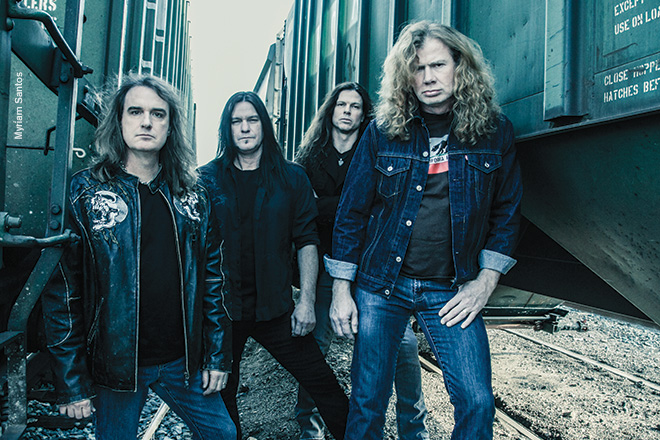 MEGADETH
MEGADETH
Dave Mustaine explains why these metal icons aren’t afraid to take risks
Megadeth’s latest album, Super Collider, celebrates 30 years in the metal trenches—and it will certainly satisfy the cravings of fans who feast on the band’s stock-in-trade: shock-and-awe thrash metal. But it may also confuse—and even anger—some die-hard headbangers. This is the most melodic record frontman Dave Mustaine has made in years, and there’s even an electric banjo on one track. Still, Mustaine—who’s the only consistent member of the band—isn’t worried. “There are people who take exception with this because they want to hear ‘Black Friday’ the rest of their lives,” he says. “I feel for them.”
Have you earned total creative license?
I don’t have a license to make bad music. When you take risks with your music and put everything on the line and it works, it makes it all worthwhile. I couldn’t have written “The Blackest Crow” 10 years ago because I would have been closed-minded, and I don’t think I had the skills. When I think about all these years trying to write music and having all this adversity, it tires you out. You’ve got to ask yourself, “Am I writing because I want to? Or am I writing because I want others to like my music?” At some point people cross that line and have to say, “It’s just not worth it anymore.”
What was your approach?
I’ll usually go into the studio and listen to a bunch of riffs and start piecing together songs. Then if there’s a part missing in between the riffs, I’ll write it on the spot. When Shawn [Drover, drums] comes he’ll listen to it and play through it a couple of times. We’ll try and get the take and build the energy of the song off the drum track. After that’s done it’s a matter of icing the cake with the bass, guitars, vocals and solos.
You selected producer Johnny K again.
We do about two records per producer and move on, and that’s been our mantra. We’ll work with somebody and if it’s successful we’ll work with him again. In an effort to stay fresh, we always try something new. We thought it had worked and was successful with Johnny [on the Thirteen album] and that’s why we revisited that. Are we going to work with a new guy next time? Probably.
And you chose the same lineup as well.
It’s like when you’re watching a two-on-one breakaway in hockey. You see the two players and they know—step, stride and pass. Note by note they’re synchronized. You feel that when you’re onstage. There’s awkwardness when you’re playing with somebody and they’re behind or in front of you or playing the wrong stuff. It’s like, “Dude, do you really want to be here?” The guys we’re playing with right now are hungrier and better players than I usually am. So I’ve got to stay on my toes.
How does it feel having reached the 30-year mark?
It’s been a total blessing. There’s nothing I could have done with my life that would have been this fulfilling. Having people come up and say, “You have no idea what ‘In My Darkest Hour’ meant for me. And doing all kinds of charity work with kids: Last year we brought a soup kitchen to Port-au-Prince, Haiti. The fans helped provide the funds. People think I’m this ogre, this unapproachable guy, and nothing is further from the truth. No matter what anybody says about me, at the end of the day, I know a thousand little kids are getting fed. So you know what? Tough.
–Steve Rosen



comment closed